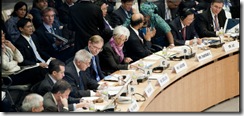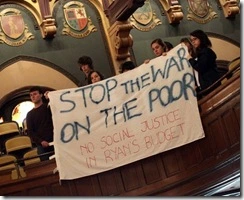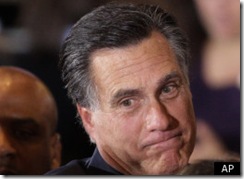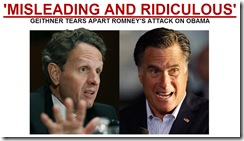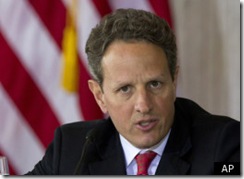By M. Ulric Killion

Photo Source: “Jon Huntsman is critical of his party and Republican candidates’ foreign policy stances”, Jon Huntsman Criticizes Republican Party, Compares Actions To Communist China, Huffington Post, April 22, 2012.
Recently, former Republican Party (GOP) candidate Jon Huntsman (former U.S. Ambassador to China under President Barack Obama) made an interesting comparison between the American Republican Party and China’s political system.
In criticism of the Republican Party and its GOP candidates, as the Huffington Post reported, Huntsman was “comparing the Republican Party to communist China and questioning the strength of this year’s presidential field.”
He strongly criticized the GOP for some of its flaws. According to the Huffington Post, when doing so Huntsman cites the following recent example,
During an event at the 92nd Street Y in New York City, Huntsman spoke candidly about his party’s flaws, lamenting the Republican National Committee’s decision to rescind an invitation to a major fundraising event after Huntsman called for a third-party candidate to enter the race.
“This is what they do in China on party matters if you talk off script,” Huntsman said.
The analogy with China presents a strong critique of what is wrong with the present state of the Republic Party.
As many are aware, the Chinese Communist Party (CCP) governs China or the People’s Republic of China. Granted, there are about eight other independent political parties in China. The other so-called independent political parties, however, must tow the line or, borrowing from Huntsman’s characterization, they cannot “talk off script.”
This is because the Constitution of the People’s Republic of China (i.e., China’s Constitution or Zhonghua Renmin Gongheguo Xianfa) actually vested the CCP with the power to govern. For instance, an excerpt from the Preamble of China’s Constitution reads,
This Constitution, in legal form . . . it is the fundamental law of the state and has supreme authority. The people of all nationalities, all state organs, the armed forces, all political and public organizations and all enterprises and institutions in the country must take the Constitution as the basic stand of conduct, and they have the duty to uphold the dignity of the Constitution and ensure its implementation.
Then there is Article 5 of China’s Constitution, which reads, “the People’s Republic of China governs the country according to law and makes it a socialist country ruled by law.”
A direct consequence in theory, practice, and ideology is that the CCP selects members of China’s national legislature, rather than by process of a national election.
There are admittedly local elections for local officials or office holders. However, this is not the same as a democratically-elected legislature.
As mentioned in an earlier writing,
A distinguishing and much-criticized characteristic of China’s one-party model of democracy, socialist democracy or “proletariat democracy” is that neither national leaders (i.e., president, vice-president, etc), nor members of the National People’s Congress (“NPC”) are subject to election to office by an electorate (i.e., the casting of votes by ordinary citizens).
In China, it presents an issue of whether there is, in fact, suffrage or universal suffrage.
It is sad and presents a crisis in American politics, especially for the American Republican Party and that those hailing themselves as Republicans and/or Republican Party candidates for political office.
This is largely due to the reality that Republican Party candidates that continue to talk “on script” arguably challenge the Western democratic ideal (i.e., from Athenian democracy, to modern democracy or democratic forms of government).
Huntsman offered a clear example of this danger, as reported by the Huffington Post, in his call “for a third-party candidate to enter the race.”
As Huntsman rightly observed,
Huntsman also spoke on Sunday about his presidential candidacy, revealing that he was less than impressed by his fellow candidates when he attended his first debate in August.
“Is this the best we could do?” Huntsman said he asked himself.
….
“Gone are the days when the Republican Party used to put forward big, bold, visionary stuff,” Huntsman said during the February interview with MSNBC that got him disinvited from the RNC fundraiser. “I think we’re going to have problems politically until we get some sort of third-party movement or some alternative voice out there that can put forward new ideas.”
This is a prefect example of how to construct an institution that will deny and defy all new ideas, innovations or solutions to problems.

Photo Source: Amanda Terkel, Sarah Steelman, Missouri GOP Senate Candidate, ‘Not Sure’ What Violence Against Women Act Is, Huffington Post, April 23, 2012.
Then there is, though indirectly, the more recent example of not being able to “talk off script” by the Missouri GOP U.S. Senate candidate, Sarah Steelman. On the issue of the “war on women,” Steelman was questioned about the pending women’s violence act that Republicans are challenging. First, and extremely difficult to believe, she answered – “I’m not sure what that is…”
Caitlin Legacki, spokesperson for the Missouri Democratic Party, took issue with her answer, especially how it “underscores how ill-equipped [Steelman] is to serve in public office.” Subsequently, Steelman, in response, issued a statement clarifying that “the candidate is open to the Republican version of the law’s reauthorization.”
First, Steelman, her support for a Republication version that Republicans are supposedly working on notwithstanding, issued a statement that first addressed the issue of the “war on women,”
“Everyday, President Obama and Senator McCaskill are making it harder for working mothers and women of all ages to find a good paying job. They continue to dictate to our families how they should live, stripping them of opportunities and freedom,” said Steelman.
Then Steelman added that “the Senate Democrats are making the current re-authorization of Violence Against Women bill into a political football.” It is notable that she now knows the full name of the law and the Republican Party script or Republican-message of economic doom for women.
If ever there was an exemplary instance of avoidance behavior, Steelman’s response is clearly such an example. This is because, as a woman, she is either clueless or in denial of the real issues characterizing the Republican Party’s assault on the rights of women or their “war on women.”
It is appalling that Steelman is either clueless or in denial of the real issues, which are women’s rights, the right to equal pay for women, fair employment rights, the Lily Ledbetter Fair Pay Act, the Affordable Care Act, abortion rights, contraception, the Blunt Amendment, the Family and Medical Leave Act, Planned Parenthood, birth control, and other issues that affect the lives of women.
But then again, maybe she simply does not know the names of these acts, especially the Ledbetter Fair Pay Act.

Photo Source: Willard Mitt Romney and Paul Krugman, Huffington Post, April 24, 2012; See also Paul Krugman, The Amnesia Candidate, The Opinion Pages – New York Times, April 22, 2012.
Then in a broader context of “talking on script,” there is the Republican Party and its GOP sure to be nominee, Willard Mitt Romney, and his handlers. Willard is leading the charge with his economic doom message. When the economy was earlier struggling more so than now, according to Willard, President Obama is doing nothing to aid economic growth, but when the economy was clearly showing upward momentum, he said President Obama is not doing enough.
In answer to our problems, the fact that running a government is not the same as running a business notwithstanding, Romney wants to present the image of the savvy businessman that knows how to create jobs. His answers, however, are vague generalities about what he going to do.
As Paul Krugman recently writes, “Just how stupid does Mitt Romney think we are? If you’ve been following his campaign from the beginning, that’s a question you have probably asked many times.”
There are exceptions, of course, because it is clear that Willard intends to cut taxes for the wealthy; keep the credits (or subsidies) for “Big Oil”; increase spending for the Pentagon; rid the nation of entitlement programs such as the Department of Education, social security, Medicare, Medicaid, and Obamacare; and get rid of those pesky federal regulations governing Wall Street, “Big Oil”, and environmental concerns; and get rid of Planned Parenthood.
None of which will promote economic growth.
One reasonably suspects that Romney’s economic plan, especially given the lack of details forthcoming from him, will be a standardized-version of the Republican Party economics that got us into the current economic crisis we have been facing. In other words, Willard will stay on script.
It is noteworthy that Steelman also stayed “on script.” It was obvious because when asked about an important issue concerning women’s rights (i.e., domestic violence), after regrouping she gave the stand pat Republician Party economic doom message or script. Steelman talked about women getting a job, but not about equal pay for women (i.e., the Lily Ledbetter Fair Pay Act).
In truth, and contrary to the economic doom message of Republicans and Romney, the American economy is showing upward movement. As Fareed Zakaria recently wrote,
A new poll in the United States shows that Americans are still deeply frustrated at the slow pace of the economic recovery. That’s understandable. Unemployment stays stubbornly high. But I was just in Europe, and they think America is booming.
Consider this: the U.S. economy is on track to grow between 2 and 3 percent this year. In Europe, by contrast, half the eurozone economies are going to actually shrink this year and not one major European country will grow over 1 percent….
And, most importantly, for now, it needs to stop imposing austerity in a depressed economy and learn from something from the example across the Atlantic. Two or 2.5 percent growth might not look so great in America, but it a lot better than negative 0.3 percent, which is the current estimate for the eurozone’s economic growth.
Additionally, the Obama administration inherited the 2008 sub-prime mortgage crisis or 2008 global financial crisis from the Bush administration. Moreover, despite the Republican Party economic doom message or Republican Party script of economic doom, as seen from those abroad, the U.S. economy is now making a come back. As Zakaria writes, from a European perspective, “American is booming.”
In this respect, the Republican Party script promotes false perceptions about the possibility of a quick recovery. While many economists are still debating whether the 2008 global financial crisis is structural in nature and thereby predicting long term recovery, the Republican Party script stays steadfast to a false economic doom message.
The Republican Party and Rmoney (Romney) will admit neither that the onset of the financial is in 2008, nor that the financial crisis occurs during the presidency of George W. Bush. For Republican Party and Republican Party candidates, it is also noticeable that keeping on script entails never mentioning the name of their former president, George W. Bush.
By staying on script, despite the hazards that Republicans are encountering, as boldly asserted by Huntsman, “Gone are the days when the Republican Party used to put forward big, bold, visionary stuff.” In other words, the Republican Party script, as earlier mentioned, denies and defies new ideas, innovations or solutions to problems.
What the Republic Party script offers an unsuspecting American populace is a big spoon full of the same economic policies that were the cause of the 2008 global financial crisis.
When playing the devil’s advocate, if there is anything conceivably new in the Republican Party script, it can only be attributable to the saying that – the old is new again.
In the end, the Republican script is about old Republican Party economics, and an earlier failed trickle down economics, which is hardly a real solution to real problems.
>>See also the recent article by Paul Krugman, which follows.
____________________
“The Amnesia Candidate”
By Paul Krugman*
The Opinion Pages – New York Times, April 22, 2012
Just how stupid does Mitt Romney think we are? If you’ve been following his campaign from the beginning, that’s a question you have probably asked many times.
But the question was raised with particular force last week, when Mr. Romney tried to make a closed drywall factory in Ohio a symbol of the Obama administration’s economic failure. It was a symbol, all right — but not in the way he intended.
First of all, many reporters quickly noted a point that Mr. Romney somehow failed to mention: George W. Bush, not Barack Obama, was president when the factory in question was closed. Does the Romney campaign expect Americans to blame President Obama for his predecessor’s policy failure?
Yes, it does. Mr. Romney constantly talks about job losses under Mr. Obama. Yet all of the net job loss took place in the first few months of 2009, that is, before any of the new administration’s policies had time to take effect. So the Ohio speech was a perfect illustration of the way the Romney campaign is banking on amnesia, on the hope that voters don’t remember that Mr. Obama inherited an economy that was already in free fall.
How does the campaign deal with people who point out the awkward reality that all of the “Obama” job losses took place before any Obama policies had taken effect? The fallback argument — which was rolled out when reporters asked about the factory closure — is that even though Mr. Obama inherited a deeply troubled economy, he should have fixed it by now. That factory is still closed, said a Romney adviser, because of the failure of Obama policies “to really get this economy going again.”
Actually, that factory would probably still be closed even if the economy had done better — drywall is mainly used in new houses, and while the economy may be coming back, the Bush-era housing bubble isn’t.
But Mr. Romney’s poor choice of a factory for his photo-op aside, I guess accusing Mr. Obama of not doing enough to promote recovery is a better argument than blaming him for the effects of Bush policies. However, it’s not much better, since Mr. Romney is essentially advocating a return to those very same Bush policies. And he’s hoping that you don’t remember how badly those policies worked.
For the Bush era didn’t just end in catastrophe; it started off badly, too. Yes, Mr. Obama’s jobs record has been disappointing — but it has been unambiguously better than Mr. Bush’s over the comparable period of his administration.
This is especially true if you focus on private-sector jobs. Overall employment in the Obama years has been held back by mass layoffs of schoolteachers and other state and local government employees. But private-sector employment has recovered almost all the ground lost in the administration’s early months. That compares favorably with the Bush era: as of March 2004, private employment was still 2.4 million below its level when Mr. Bush took office.
Oh, and where have those mass layoffs of schoolteachers been taking place? Largely in states controlled by the G.O.P.: 70 percent of public job losses have been either in Texas or in states where Republicans recently took control.
Which brings me to another aspect of the amnesia campaign: Mr. Romney wants you to attribute all of the shortfalls in economic policy since 2009 (and some that happened in 2008) to the man in the White House, and forget both the role of Republican-controlled state governments and the fact that Mr. Obama has faced scorched-earth political opposition since his first day in office. Basically, the G.O.P. has blocked the administration’s efforts to the maximum extent possible, then turned around and blamed the administration for not doing enough.
So am I saying that Mr. Obama did everything he could, and that everything would have been fine if he hadn’t faced political opposition? By no means. Even given the political constraints, the administration did less than it could and should have in 2009, especially on housing. Furthermore, Mr. Obama was an active participant in Washington’s destructive “pivot” away from jobs to a focus on deficit reduction.
And the administration has suffered repeatedly from complacency — taking a few months of good news as an excuse to rest on its laurels rather than hammering home the need for more action. It did that in 2010, it did it in 2011, and to a certain extent it has been doing the same thing this year too. So there is a valid critique one can make of the administration’s handling of the economy.
But that’s not the critique Mr. Romney is making. Instead, he’s basically attacking Mr. Obama for not acting as if George Bush had been given a third term. Are the American people — and perhaps more to the point, the news media — forgetful enough for that attack to work? I guess we’ll find out.
*Paul Krugman joined The New York Times in 1999 as a columnist on the Op-Ed Page and continues as professor of Economics and International Affairs at Princeton University. . . .
The Amnesia Candidate – NY Times
_______________
See also Republican Conundrum
All Rights Reserved by M. Ulric Killion, 2012.















